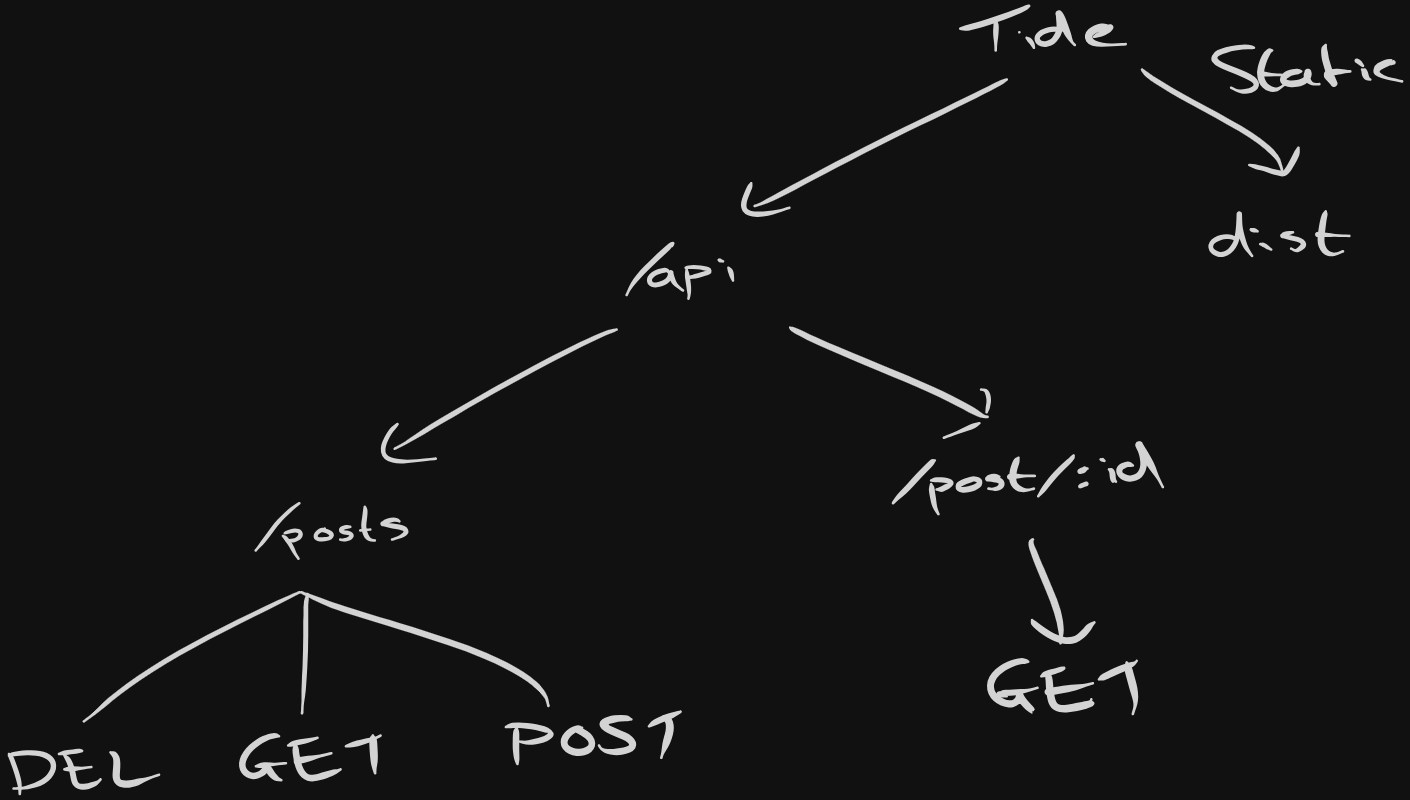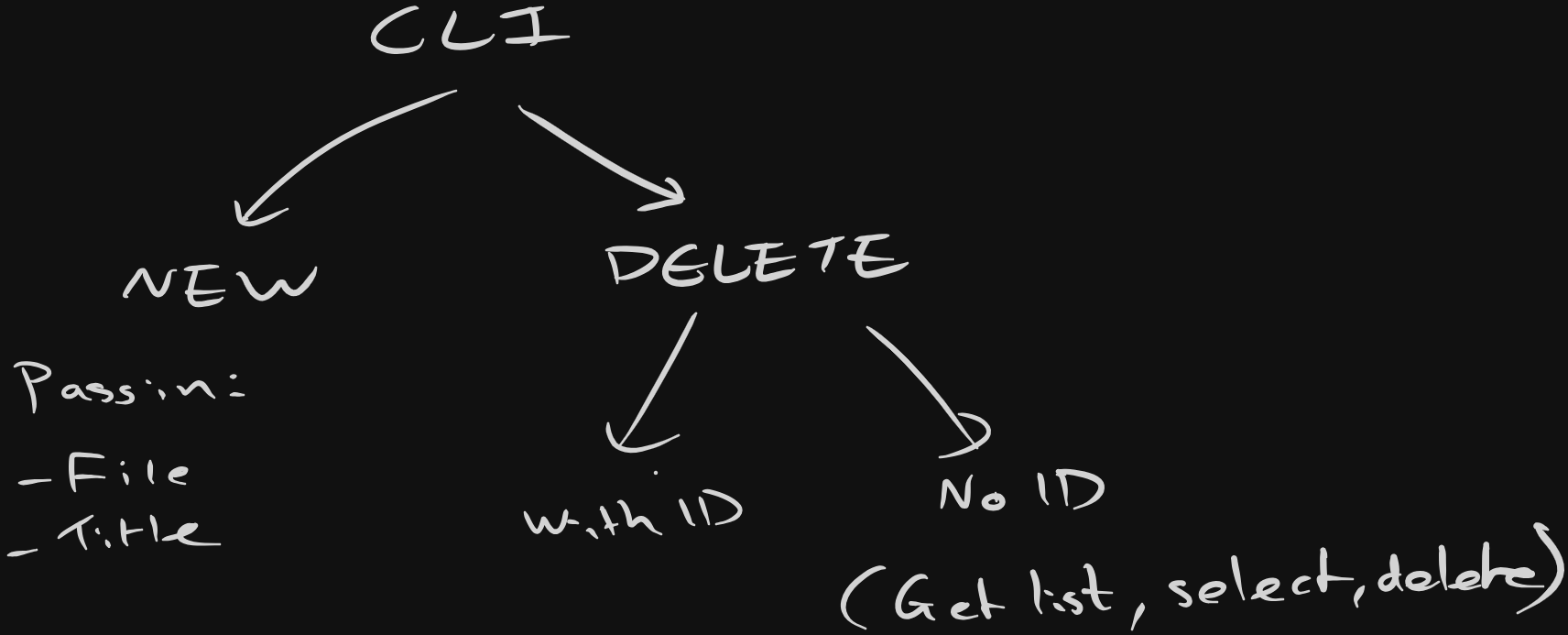Intro
When I initially wrote the code for this site, it was to create a better solution than something like Hugo but after a day of bashing up my first http-server in Rust, it was botched, and not my best work, but it worked
Using axum, Postgres & static HTML it lacked many things, but longevity was my main concern.
For example, to create a new post I had to open up post-man, due to my lack of knowledge of tools such as clap, and had no containerization.
It wasn’t my best work.
Design

Simple yet effective, Docker & Nginx behind Tide.
 The CLI-tool, the same again, simply a new post option, or delete
The CLI-tool, the same again, simply a new post option, or delete
Tech Stack
After being inspired by a DreamsOfCode video,I decided on Tide for my http-server for it’s seemingly go-like syntax and inner-workings. Leaving me with:
Issues
There was no lack of issues I encountered, varying with frustration as my project went along…
UUID’s
With my sqlx migration being this file:
-- migrations/1_initial_setup.sql
CREATE TABLE posts (
id UUID NOT NULL PRIMARY KEY,
title TEXT NOT NULL,
created_at INTEGER NOT NULL
);
And my model being:
use sqlx::types::Uuid;
#[derive(sqlx::FromRow, Serialize)]
pub struct Post {
pub id: Uuid,
pub title: String,
pub created_at: i64,
}
When creating a post via:
let inserted_post = sqlx::query_as!(
Post,
r#"INSERT INTO posts (id, title, created_at) VALUES (?, ?, ?) RETURNING id, title, created_at"#,
id,
new_post.title,
new_post.created_at
)
I encountered a sqlx error:
# `unsupported type NULL of column #1`
After some digging I eventually sorted this issue via this GitHub issue
This would later bite me in the ass, as UUID’s were being store inside the database as “OK[I3%”, so I would revert this.
Docker…
Containerizing my code was not a huge issue, but optimizing it proved to be a much harder challenge, with 5 minute builds locally, and missing dependencies left right and center, I had to battle with docker for many hours, and eventually settled on this:
# Use a smaller base image for the builder stage
FROM rust:slim as builder
WORKDIR /app
COPY . .
COPY .env .
# Install build dependencies
RUN apt-get update && \
apt-get install -y pkg-config libssl-dev perl make musl-tools
# Add only the necessary target for the build
RUN rustup target add x86_64-unknown-linux-musl
# Build the application
RUN cargo build --release --target=x86_64-unknown-linux-musl && \
strip target/x86_64-unknown-linux-musl/release/kimbell
# Use a smaller base image for the final stage
FROM alpine:3.14
WORKDIR /app
# Copy only the necessary files from the builder stage
COPY --from=builder /app/target/x86_64-unknown-linux-musl/release/kimbell /app/
COPY database.sqlite /app/
COPY dist /app/dist
COPY md_files /app/md_files
EXPOSE 3000
CMD ["./kimbell"]
Whilst more optimizations could take place, my sanity might be lost in the meantime.
Coming from Go, and it being my primary, and only language I would describe myself as advanced in from 2018-2020, combining rust’s slow builds + a docker build step is excruciating to say the least..
Nginx’s headers
I’ve setup my fair share of static JS sites using Nginx, or using the reverse-proxy feature to send requests to an Express JS server. One thing I had never used, due to the simplicity of the site’s I have made, was headers.
After creating my CLI-tool to create and delete posts, the API-hey in the header “api-key” was not working…. After many hours of confusion, googling and frustration, I realized NGINX removes headers with _’s in by default…
I promptly changed all occurrences of said underscore, then promptly forgot one of them and continued to debug for hours, exciting…
Code
Main.rs:
use crate::handlers::{create_post, delete_post, get_post, get_posts};
use dotenv::dotenv;
use std::io::ErrorKind;
use tide::log::error;
use tide::log::info;
use tide::log::LevelFilter;
use tide::utils::After;
mod handlers;
mod models;
use env_logger;
use sqlx::sqlite::SqlitePoolOptions;
use std::env;
use tide::Response;
use tide::StatusCode;
#[derive(Clone)]
pub struct State {
db_pool: sqlx::SqlitePool,
}
#[async_std::main]
async fn main() -> tide::Result<()> {
env_logger::builder()
.filter_level(LevelFilter::Debug)
.init();
info!("Initialising...");
if let Err(e) = async_std::fs::create_dir_all("./md_files").await {
eprintln!("Error creating 'md_files' directory: {}", e);
return Err(tide::Error::from_str(
StatusCode::InternalServerError,
"Internal Server Error",
));
}
dotenv().ok();
info!("Env vars OK");
let database_url = env::var("DATABASE_URL").expect("DB URL NOT SET");
let db_pool = SqlitePoolOptions::new()
.max_connections(5)
.connect(&database_url)
.await?;
let state = State { db_pool };
let mut app = tide::with_state(state);
app.with(tide::log::LogMiddleware::new());
info!("DB Connection OK");
app.with(After(|mut res: Response| async {
if let Some(err) = res.downcast_error::<async_std::io::Error>() {
match err.kind() {
ErrorKind::NotFound => {
error!("{:?}", err);
let msg = format!("Error: {:?}", err);
res.set_status(StatusCode::NotFound);
res.set_body(msg);
}
_ => {
error!("{:?}", err);
let msg = format!("Internal Server Error: {:?}", err);
res.set_status(StatusCode::InternalServerError);
res.set_body(msg);
}
}
}
Ok(res)
}));
app.at("/api/posts").get(get_posts);
app.at("/api/posts").post(create_post);
app.at("/api/posts/:uuid").delete(delete_post);
app.at("/api/post/:id").get(get_post);
app.at("/posts").serve_file("dist/index.html")?;
app.at("/post/:id").serve_file("dist/index.html")?;
app.at("/").serve_file("dist/index.html")?;
app.at("/index.html").serve_file("dist/index.html")?;
app.at("/assets/").serve_dir("dist/assets/")?;
info!("Created Routes");
app.listen("0.0.0.0:3000").await?;
Ok(())
}
handlers.rs
pub async fn get_posts(req: Request<State>) -> tide::Result {
let db_pool = &req.state().db_pool;
let posts = query_as!(Post, r#"SELECT id, title, created_at FROM posts"#)
.fetch_all(db_pool)
.await?;
let response_json = json!({
"info": { "count": posts.len() },
"posts": posts,
});
let mut response = Response::new(StatusCode::Ok);
response.insert_header("Content-Type", "application/json");
response.insert_header("Access-Control-Allow-Origin", "*");
response.set_body(response_json);
Ok(response)
}
pub async fn get_post(req: Request<State>) -> tide::Result {
let md_file_name: String = req.param("id")?.to_string();
let db_pool = &req.state().db_pool;
let id = md_file_name.clone();
let post = query_as!(
PostNoID,
r#"SELECT title, created_at FROM posts WHERE id=?"#,
id
)
.fetch_one(db_pool)
.await?;
let file_content = read_md_file(&md_file_name).await?;
let post_content = parse_md_content(&file_content);
let response_json = json!({
"post": NewPost{
created_at: post.created_at,
title: post.title,
content: post_content.content
},
});
let mut response = Response::new(StatusCode::Ok);
response.insert_header("Content-Type", "application/json");
response.insert_header("Access-Control-Allow-Origin", "*");
response.set_body(response_json);
Ok(response)
}
async fn read_md_file(file_name: &str) -> tide::Result<String> {
let file_path = format!("./md_files/{}.md", file_name);
match async_std::fs::read_to_string(file_path).await {
Ok(content) => Ok(content),
Err(e) => {
let error_msg = format!("Error reading MD file: {} : {}", file_name, e);
Err(tide::Error::new(
StatusCode::NotFound,
anyhow::Error::msg(error_msg),
))
}
}
}
fn parse_md_content(content: &str) -> PostContent {
PostContent {
content: content.to_string(),
}
}
async fn store_md_file(id: &String, content: &str) -> tide::Result<()> {
let file_path = format!("./md_files/{}.md", id);
fs::write(&file_path, content)?;
Ok(())
}
pub async fn delete_post(req: Request<State>) -> tide::Result {
let db_pool = &req.state().db_pool;
let api_key = env::var("API_KEY").expect("API_KEY not found in .env");
let provided_key: String = req
.header("api-key")
.map(|header_values| header_values.as_str().to_string())
.unwrap_or_else(|| "na".to_string());
if provided_key == api_key {
let uuid_param: String = req.param("uuid").unwrap_or("Error").to_string();
if sqlx::query!(r#"DELETE FROM posts WHERE id = ?"#, uuid_param)
.execute(db_pool)
.await?
.rows_affected()
> 0
{
if let Err(file_error) = fs::remove_file(format!("./md_files/{}.md", uuid_param)) {
info!(
"Error deleting file: ./md_files/{}.md Error : {}",
uuid_param, file_error
);
let response_json = json!({
"message": "Error deleting file",
"error": file_error.to_string(),
});
let mut response = Response::new(StatusCode::InternalServerError);
response.insert_header("Content-Type", "application/json");
response.insert_header("Access-Control-Allow-Origin", "*");
response.set_body(response_json);
return Ok(response);
}
info!("Successfully deleted post with ID {uuid_param}");
let response_json = json!({
"message": "Post deleted successfully",
});
let mut response = Response::new(StatusCode::Ok);
response.insert_header("Content-Type", "application/json");
response.insert_header("Access-Control-Allow-Origin", "*");
response.set_body(response_json);
return Ok(response);
} else {
info!("Unsuccessfully deleted post with ID {uuid_param}");
// Handle the case where the post was not found
let response_json = json!({
"message": "Post not found",
});
let mut response = Response::new(StatusCode::NotFound);
response.insert_header("Content-Type", "application/json");
response.insert_header("Access-Control-Allow-Origin", "*");
response.set_body(response_json);
return Ok(response);
}
}
let response_json = json!({
"message": "Unauthorized. Invalid API key",
});
let mut response = Response::new(StatusCode::Unauthorized);
response.insert_header("Content-Type", "application/json");
response.insert_header("Access-Control-Allow-Origin", "*");
response.set_body(response_json);
Ok(response)
}
pub async fn create_post(mut req: Request<State>) -> tide::Result {
let api_key = env::var("API_KEY").expect("API_KEY not found in .env");
let provided_key: String = req
.header("api-key")
.map(|header_values| header_values.as_str().to_string())
.unwrap_or_else(|| "na".to_string());
if provided_key == api_key {
let new_post: NewPost = req.body_json().await?;
info!("Received new post - Name: {}", new_post.title);
let db_pool = &req.state().db_pool;
let id = Uuid::new_v4();
let id_string = id.to_string();
info!("UUID Created {}", id_string);
store_md_file(&id_string, &new_post.content).await?;
let inserted_post = sqlx::query_as!(
Post,
r#"INSERT INTO posts (id, title, created_at) VALUES (?, ?, ?) RETURNING id, title, created_at"#,
id_string,
new_post.title,
new_post.created_at
)
.fetch_one(db_pool)
.await?;
let response_json = json!({
"message": "Post created successfully",
"post": inserted_post,
});
let mut response = Response::new(StatusCode::Created);
response.insert_header("Content-Type", "application/json");
response.insert_header("Access-Control-Allow-Origin", "*");
response.set_body(response_json);
return Ok(response);
}
let response_json = json!({
"message": "Unauthorized. Invalid API key",
});
let mut response = Response::new(StatusCode::Unauthorized);
response.insert_header("Content-Type", "application/json");
response.insert_header("Access-Control-Allow-Origin", "*");
response.set_body(response_json);
Ok(response)
}
new_post.rs ( CLI tool):
use anyhow::{anyhow, Ok};
use reqwest::Client;
use reqwest::{self};
use serde::{Deserialize, Serialize};
use std::fs::File;
use std::io::Read;
use std::path::PathBuf;
use std::{env, io};
mod models;
use crate::models::ApiResponse;
use clap::{arg, command, value_parser, Command};
#[tokio::main]
async fn main() -> Result<(), anyhow::Error> {
dotenv::dotenv().ok();
let matches = command!()
.about("Kimbell Posts - CLI to edit posts on my site")
.version("0.0.1")
.subcommand(
Command::new("create")
.about("Creates a post")
.arg(
arg!(
-n --name <String> "Sets the name"
)
.required(true)
.value_parser(clap::value_parser!(String)),
)
.arg(
arg!(
-f --file <FILE> "Sets the post file"
)
.required(true)
.value_parser(value_parser!(std::path::PathBuf)),
),
)
.subcommand(
Command::new("delete").about("Deletes a post").arg(
arg!(
-u --uuid <String> "Sets the UUID"
)
.required(false),
),
)
.get_matches();
match matches.subcommand_name() {
Some("create") => {
let create_matches = matches.subcommand_matches("create").unwrap();
create_post(
create_matches
.get_one::<String>("name")
.unwrap()
.to_string(),
create_matches
.get_one::<PathBuf>("file")
.unwrap()
.to_path_buf(),
)
.await?;
}
Some("delete") => {
let delete_matches = matches.subcommand_matches("delete").unwrap();
delete_post(delete_matches.get_one::<String>("uuid").cloned()).await?;
}
_ => println!("No subcommand provided"),
}
Ok(())
}
#[derive(Serialize, Deserialize)]
struct NewPost {
content: String,
created_at: i64,
title: String,
}
async fn create_post(name: String, path: PathBuf) -> Result<(), anyhow::Error> {
println!("Creating post with name {} and path {:?}", name, path);
let api_key = env::var("API_KEY").expect("API_KEY not found in .env");
let local = env::var("LOCAL").expect("LOCAL not found in .env");
let mut file = File::open(&path)?;
let mut content = String::new();
file.read_to_string(&mut content)?;
let date = chrono::Utc::now().timestamp();
let my_json_struct = NewPost {
content,
created_at: date,
title: name,
};
let json_body = serde_json::to_string(&my_json_struct)?;
let client = Client::new();
let uri = match local.as_str() {
"true" => "http://127.0.0.1:3000".to_string(),
"false" => "https://kimbell.uk".to_string(),
_ => "error".to_string(),
};
let response = client
.post(format!("{uri}/api/posts"))
.header("api-key", api_key)
.body(json_body)
.send()
.await?;
if response.status().is_success() {
println!("File successfully uploaded!");
Ok(())
} else {
Err(anyhow!(
"Failed to upload file. Status code: {}, body {}",
response.status(),
response.text().await?
)
.into())
}
}
async fn delete_post(uuid: Option<String>) -> Result<(), anyhow::Error> {
match uuid {
Some(uuid) => {
println!("Deleting post {}", &uuid);
delete_post_by_uuid(&uuid).await
}
None => {
let api_key = env::var("API_KEY").expect("API_KEY not found in .env");
let client = Client::new();
let local = env::var("LOCAL").expect("LOCAL not found in .env");
let uri = match local.as_str() {
"true" => "http://127.0.0.1:3000".to_string(),
"false" => "https://kimbell.uk".to_string(),
_ => return Err(anyhow!("Invalid value for 'LOCAL' in .env")),
};
let api_response = client
.get(format!("{}/api/posts", uri))
.header("api-key", &api_key)
.send()
.await?
.json::<ApiResponse>()
.await?;
let uuids: Vec<(String, String)> = api_response
.posts
.iter()
.map(|post| (post.id.clone(), post.title.clone()))
.collect();
if let Some((selected_uuid, selected_title)) = choose_uuid(&uuids) {
println!("Deleting post {}: {}", &selected_uuid, &selected_title);
delete_post_by_uuid(&selected_uuid).await
} else {
println!("No UUID selected. Exiting.");
Ok(())
}
}
}
}
async fn delete_post_by_uuid(uuid: &str) -> Result<(), anyhow::Error> {
let api_key = env::var("API_KEY").expect("API_KEY not found in .env");
let client = Client::new();
let local = env::var("LOCAL").expect("LOCAL not found in .env");
let uri = match local.as_str() {
"true" => "http://127.0.0.1:3000".to_string(),
"false" => "https://kimbell.uk".to_string(),
_ => return Err(anyhow!("Invalid value for 'LOCAL' in .env")),
};
let response = client
.delete(format!("{}/api/posts/{}", uri, uuid))
.header("api-key", &api_key)
.send()
.await?;
if response.status().is_success() {
println!("File with UUID {} successfully deleted!", uuid);
Ok(())
} else {
Err(anyhow!("Failed to delete file. Status code: {}", response.status()).into())
}
}
fn choose_uuid(uuids: &[(String, String)]) -> Option<(String, String)> {
println!("Available UUIDs:");
for (index, (uuid, title)) in uuids.iter().enumerate() {
println!("{}. {}: {}", index + 1, uuid, title);
}
println!("Enter the number corresponding to the UUID you want to delete:");
let mut input = String::new();
io::stdin().read_line(&mut input).ok()?;
if let anyhow::Result::Ok(index) = input.trim().parse::<usize>() {
if index > 0 && index <= uuids.len() {
return Some(uuids[index - 1].clone());
}
}
println!("Invalid selection. Please enter a valid number.");
None
}
There are more files on the Repository Link but for length’s sake, I’ll keep it to these two files.
Conclusion
Moving from go->rust has been, interesting… With incredible compiler errors giving me suggestions that tell me exactly what I need to do, to compiler errors with little to no documentation on the internet, I find myself in a love-hate relationship with Rust.
It’s been a great experience to code in this language, and I will choose it for many future projects, except more-so on the large-scale ones, as where I am currently at, my speed at development is far higher in Go than Rust.
Tide’s simple nature is amazing, although I believe a more consistent method for database’s needs to be adopted across http-server frameworks.